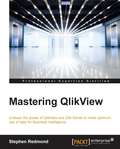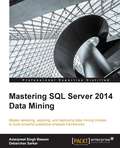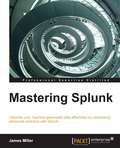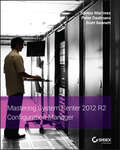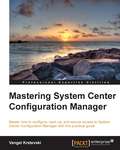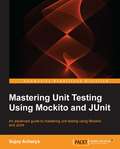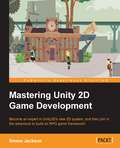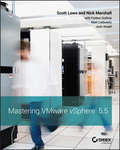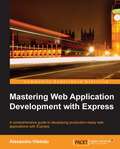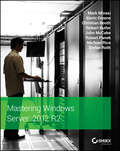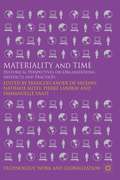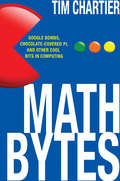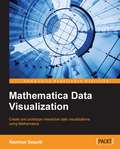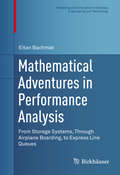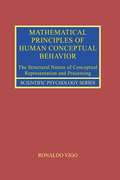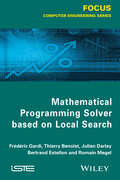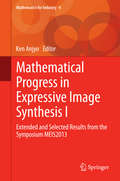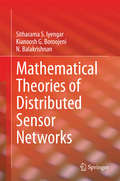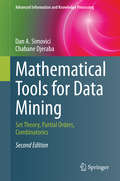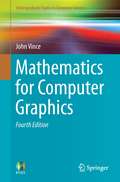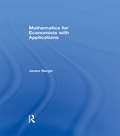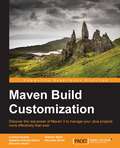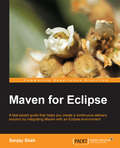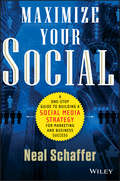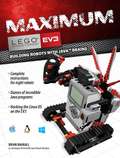- Table View
- List View
Mastering QlikView
by Stephen RedmondIf you are a business application developer or a system analyst who has learned QlikView and Qlik Sense and now want to take your learning to a higher level, then this book is for you. It is assumed that you are aware of the fundamentals of QlikView and have working knowledge of development and in-memory analytics.
Mastering SQL Server 2014 Data Mining
by Debarchan Sarkar Amarpreet Singh BassanIf you are a developer who is working on data mining for large companies and would like to enhance your knowledge of SQL Server Data Mining Suite, this book is for you. Whether you are brand new to data mining or are a seasoned expert, you will be able to master the skills needed to build a data mining solution.
Mastering Splunk
by James MillerThis book is for those Splunk developers who want to learn advanced strategies to deal with big data from an enterprise architectural perspective. You need to have good working knowledge of Splunk.
Mastering System Center 2012 R2 Configuration Manager
by Peter Daalmans Santos Martinez Brett BennettInvaluable coverage on all aspects of System Center 2012 R2 Configuration ManagerCompletely updated for System Center 2012 R2 Configuration Manager, this comprehensive book provides intermediate and advanced coverage of all aspects of the product, including planning and installation, migrating from previous versions of Configuration Manager, deploying software and operating systems, security, monitoring and troubleshooting, and automating and customizing. Provides numerous real-world scenarios to show you how to use the tool in various contextsExplores planning and installation and migrating from SCCM 2007Walks you through deploying software and operating systems, security, monitoring, and troubleshootingDemonstrates automating and customizing SCCM 2012 with scriptsThis essential book provides you with all the information you need to get savvy with System Center 2012 R2 Configuration Manager.
Mastering System Center Configuration Manager
by Vangel KrstevskiThis book is perfect for IT administrators who are looking to enhance their skills on system and asset management. A fair understanding of the core elements and applications related to SCCM would be helpful.
Mastering Unit Testing Using Mockito and JUnit
by Sujoy AcharyaA practical and easy-to-follow, yet comprehensive, guide to learning advanced JUnit testing. Each topic is explained and placed in context, and for the more inquisitive, there are more details of the concepts used. This book is for you if you are a developer with some experience in Java application development as well as a basic knowledge of JUnit testing. But for those whose skill set is void of any prior experience with JUnit testing, the book also covers basic fundamentals to get you acquainted with the concepts before putting them into practise.
Mastering Unity 2D Game Development
by Simon JacksonIf you have C# knowledge but now want to become truly confident in creating fully functional 2D RPG games with Unity, then this book will show you everything you need to know.
Mastering VMware vSphere 5.5
by Scott Lowe Matt Liebowitz Forbes Guthrie Nick Marshall Josh AtwellThe 2013 edition of the bestselling vSphere book on the marketVirtualization remains the hottest trend in the IT world, and VMware vSphere is the industry's most widely deployed virtualization solution. The demand for IT professionals skilled in virtualization and cloud-related technologies is great and expected to keep growing. This comprehensive Sybex guide covers all the features and capabilities of VMware vSphere, showing administrators step by step how to install, configure, operate, manage, and secure it.This perfect blend of hands-on instruction, conceptual explanation, and practical application is reinforced with real-world examples. Led by Scott Lowe and Nick Marshall, both VMware vExperts, the author team provides expertise that will prepare IT professionals to excel in using this virtualization technology.Virtualization is seen as a "best practice" for high availability and disaster recovery solutions, as well as for applications such as Exchange Server and SharePointIDC estimates that there are as many as 7 million jobs available worldwide in virtualization and cloud technologyProvides hands-on instruction in all the latest features and capabilities of VMware vSphere, with both conceptual explanations and practical applicationsAuthor team is lead by Scott Lowe and Nick Marshall, well-known VMware experts and popular bloggersMastering VMware vSphere provides what every virtualization professional needs to know.
Mastering Web Application Development with Express
by Alexandru VladutuIf you are a Node.js developer who wants to take your Express skills to the next level and develop high performing, reliable web applications using best practices, this book is ideal for you. The only prerequisite is knowledge of Node.js.
Mastering Windows Server® 2012 R2
by John Mccabe Robert Butler Mark Minasi Kevin Greene Christian Booth Robert Panek Michael Rice Stefan RothCheck out the new Hyper-V, find new and easier ways to remotely connect back into the office, or learn all about Storage Spaces--these are just a few of the features in Windows Server 2012 R2 that are explained in this updated edition from Windows authority Mark Minasi and a team of Windows Server experts led by Kevin Greene. This book gets you up to speed on all of the new features and functions of Windows Server, and includes real-world scenarios to put them in perspective. If you're a system administrator upgrading to, migrating to, or managing Windows Server 2012 R2, find what you need to do the job in this complete resource. Learn all about: Installing or upgrading to and managing Windows Server 2012 R2 Understanding Microsoft NIC teams 2012 and PowerShell Setting up via GUI or updated Server Core 2012 Migrating, merging, and modifying your Active Directory Managing address spaces with IPAM Understanding new shared storage, storage spaces, and better tools Controlling access to file shares--a new and improved approach Using and administering Remote Desktop, Virtual Desktop, and Hyper-V®
Materiality and Time
by Francois-Xavier de Vaujany Nathalie Mitev Pierre Laniray Emmanuelle VaastSociomaterial research overcomes the dichotomy between social and material worlds by concentrating on organizational practices. These practices are constituted by, but also produce, material and social dynamics. This research is currently having an important impact in management studies and adopts a subjective investigation of time to explore materiality and materialization. Studying the institutional evolution of an organization implies long time spans and it is shown more clearly through the inclusion of material traces of past actions. Materiality and Time is split into three parts: Part I explores how time is materialized and performed in organizations, i. e. how artefacts and material space perform time and temporal dynamics in organizations. Part II examines how organizations and organizational members are constituted by and constitutive of material artefacts. Part III reflects on what a historical perspective on these materializations can bring to the study of organizations. Contributions focus on the materialization of time and the material dynamic of organizations.
Math Bytes: Google Bombs, Chocolate-Covered Pi, and Other Cool Bits in Computing
by Tim P. ChartierAn inviting collection of fun, hands-on applications in mathematics and computingThis book provides a fun, hands-on approach to learning how mathematics and computing relate to the world around us and help us to better understand it. How can reposting on Twitter kill a movie's opening weekend? How can you use mathematics to find your celebrity look-alike? What is Homer Simpson’s method for disproving Fermat’s Last Theorem? Each topic in this refreshingly inviting book illustrates a famous mathematical algorithm or result--such as Google’s PageRank and the traveling salesman problem--and the applications grow more challenging as you progress through the chapters. But don’t worry, helpful solutions are provided each step of the way.Math Bytes shows you how to do calculus using a bag of chocolate chips, and how to prove the Euler characteristic simply by doodling. Generously illustrated in color throughout, this lively and entertaining book also explains how to create fractal landscapes with a roll of the dice, pick a competitive bracket for March Madness, decipher the math that makes it possible to resize a computer font or launch an Angry Bird--and much, much more. All of the applications are presented in an accessible and engaging way, enabling beginners and advanced readers alike to learn and explore at their own pace--a bit and a byte at a time.
Mathematica Data Visualization
by Nazmus SaquibIf you are planning to create data analysis and visualization tools in the context of science, engineering, economics, or social science, then this book is for you. With this book, you will become a visualization expert, in a short time, using Mathematica.
Mathematical Adventures in Performance Analysis
by Eitan Bachmat This book describes problems in the field of performance analysis, primarily the study of storage systems and the diverse mathematical techniques that are required for solving them. Topics covered include best practices for scheduling I/O requests to a disk drive, how this problem is related to airplane boarding, and how both problems can be modeled using space-time geometry. Also provided is an explanation of how Riemann's proof of the analytic continuation and functional equation of the Riemann zeta function can be used to analyze express line queues in a minimarket. Overall, the book displays the surprising relevance of abstract mathematics that is not usually associated with applied mathematics topics. Advanced undergraduate students or graduate students with an interest in the applications of mathematics will find this book to be a useful resource. It will also be of interest to professional mathematicians who want exposure to the surprising ways that theoretical mathematics may be applied to engineering problems. To encourage further study, each chapter ends with notes pointing to various related topics that the reader may want pursue. This mathematically rigorous work was noted in the news section of the journal Nature, and in popular media such as New Scientist, The Wall Street Journal, The Guardian, and USA Today.
Mathematical Principles of Human Conceptual Behavior: The Structural Nature of Conceptual Representation and Processing (Scientific Psychology Series)
by Ronaldo VigoThe ability to learn concepts lies at the very core of human cognition, enabling us to efficiently classify, organize, identify, and store complex information. In view of the basic role that concepts play in our everyday physical and mental lives, the fields of cognitive science and psychology face three long standing challenges: discovering the laws that govern concept learning and categorization behavior in organisms, showing how they inform other areas of cognitive research, and describing them with the mathematical systematicity and precision found in the physical sciences. In light of these theoretical and methodological shortcomings, this volume will introduce a set of general mathematical principles for predicting and explaining conceptual behavior. The author’s theory is based on seven fundamental constructs of universal science: invariance, complexity, information, similarity, dissimilarity, pattern, and representation. These constructs are joined by a novel mathematical framework that does not depend on probability theory, and derives key results from conceptual behavior research with other key areas of cognitive research such as pattern perception, similarity assessment, and contextual choice. The result is a unique and systematic unifying foundation for cognitive science in the tradition of classical physics.
Mathematical Programming Solver Based on Local Search
by Frédéric Gardi Thierry Benoist Julien Darlay Bertrand Estellon Romain MegelThis book covers local search for combinatorial optimization and its extension to mixed-variable optimization. Although not yet understood from the theoretical point of view, local search is the paradigm of choice for tackling large-scale real-life optimization problems. Today's end-users demand interactivity with decision support systems. For optimization software, this means obtaining good-quality solutions quickly. Fast iterative improvement methods, like local search, are suited to satisfying such needs. Here the authors show local search in a new light, in particular presenting a new kind of mathematical programming solver, namely LocalSolver, based on neighborhood search. First, an iconoclast methodology is presented to design and engineer local search algorithms. The authors' concern regarding industrializing local search approaches is of particular interest for practitioners. This methodology is applied to solve two industrial problems with high economic stakes. Software based on local search induces extra costs in development and maintenance in comparison with the direct use of mixed-integer linear programming solvers. The authors then move on to present the LocalSolver project whose goal is to offer the power of local search through a model-and-run solver for large-scale 0-1 nonlinear programming. They conclude by presenting their ongoing and future work on LocalSolver toward a full mathematical programming solver based on local search.
Mathematical Progress in Expressive Image Synthesis I
by Ken AnjyoThis book presents revised versions of the best papers selected from the symposium "Mathematical Progress in Expressive Image Synthesis" (MEIS2013) held in Fukuoka, Japan, in 2013. The topics cover various areas of computer graphics (CG), such as surface deformation/editing, character animation, visual simulation of fluids, texture and sound synthesis and photorealistic rendering. From a mathematical point of view, the book also presents papers addressing discrete differential geometry, Lie theory, computational fluid dynamics, function interpolation and learning theory. This book showcases the latest joint efforts between mathematicians, CG researchers and practitioners exploring important issues in graphics and visual perception. The book provides a valuable resource for all computer graphics researchers seeking open problem areas, especially those now entering the field who have not yet selected a research direction.
Mathematical Theories of Distributed Sensor Networks
by N. Balakrishnan Sitharama S. Iyengar Kianoosh G. BoroojeniThis book provides a Mathematical Theory of Distributed Sensor Networks. It introduces the Mathematical & Computational Structure by discussing what they are, their applications and how they differ from traditional systems. It also explains how mathematics are utilized to provide efficient techniques implementing effective coverage, deployment, transmission, data processing, signal processing, and data protection within distributed sensor networks. Finally, it discusses some important challenges facing mathematics to get more incite to the multidisciplinary area of distributed sensor networks. -This book will help design engineers to set up WSN-based applications providing better use of resources while optimizing processing costs. -This book is highly useful for graduate students starting their first steps in research to apprehend new approaches and understand the mathematics behind them and face promising challenges. -This book aims at presenting a formal framework allowing to show how mathematical theories can be used to provide distributed sensor modeling and to solve important problems such as coverage hole detection and repair. -This book aims at presenting the current state of the art in formal issues related to sensor networking. It can be used as a handbook for different classes at the graduate level and the undergraduate level. It is self contained and comprehensive, presenting a complete picture of the discipline of optical network engineering including modeling functions, controlling quality of service, allocation resources, monitoring traffic, protecting infrastructure, and conducting planning. This book addresses a large set of theoretical aspects. It is designed for specialists in ad hoc and wireless sensor networks and does not include discusses on very promising areas such as homotopy, computational geometry, and wavelet transforms.
Mathematical Tools for Data Mining
by Dan A. Simovici Chabane DjerabaData mining essentially relies on several mathematical disciplines, many of which are presented in this second edition of this book. Topics include partially ordered sets, combinatorics, general topology, metric spaces, linear spaces, graph theory. To motivate the reader a significant number of applications of these mathematical tools are included ranging from association rules, clustering algorithms, classification, data constraints, logical data analysis, etc. The book is intended as a reference for researchers and graduate students. The current edition is a significant expansion of the first edition. We strived to make the book self-contained and only a general knowledge of mathematics is required. More than 700 exercises are included and they form an integral part of the material. Many exercises are in reality supplemental material and their solutions are included.
Mathematics for Computer Graphics
by John VinceJohn Vince explains a wide range of mathematical techniques and problem-solving strategies associated with computer games, computer animation, virtual reality, CAD and other areas of computer graphics in this updated and expanded fourth edition. The first four chapters revise number sets, algebra, trigonometry and coordinate systems, which are employed in the following chapters on vectors, transforms, interpolation, 3D curves and patches, analytic geometry and barycentric coordinates. Following this, the reader is introduced to the relatively new topic of geometric algebra, and the last two chapters provide an introduction to differential and integral calculus, with an emphasis on geometry. Mathematics for Computer Graphics covers all of the key areas of the subject, including: Number sets Algebra Trigonometry Coordinate systems Transforms Quaternions Interpolation Curves and surfaces Analytic geometry Barycentric coordinates Geometric algebra Differential calculus Integral calculus This fourth edition contains over 120 worked examples and over 270 illustrations, which are central to the author's descriptive writing style. Mathematics for Computer Graphics provides a sound understanding of the mathematics required for computer graphics, giving a fascinating insight into the design of computer graphics software and setting the scene for further reading of more advanced books and technical research papers.
Mathematics for Economists with Applications
by James BerginMathematics for Economists with Applications provides detailed coverage of the mathematical techniques essential for undergraduate and introductory graduate work in economics, business and finance. Beginning with linear algebra and matrix theory, the book develops the techniques of univariate and multivariate calculus used in economics, proceeding to discuss the theory of optimization in detail. Integration, differential and difference equations are considered in subsequent chapters. Uniquely, the book also features a discussion of statistics and probability, including a study of the key distributions and their role in hypothesis testing. Throughout the text, large numbers of new and insightful examples and an extensive use of graphs explain and motivate the material. Each chapter develops from an elementary level and builds to more advanced topics, providing logical progression for the student, and enabling instructors to prescribe material to the required level of the course. With coverage substantial in depth as well as breadth, and including a companion website at www.routledge.com/cw/bergin, containing exercises related to the worked examples from each chapter of the book, Mathematics for Economists with Applications contains everything needed to understand and apply the mathematical methods and practices fundamental to the study of economics.
Maven Build Customization
by Roberto Baldi Lorenzo AnarduThis book is for developers and delivery managers who have some experience with Maven and Java, but want to extend their knowledge to automate the building process, thereby reducing human errors.
Maven for Eclipse
by Sanjay ShahIf you want to learn about Maven and use it from within Eclipse to develop Java projects, this is the book for you. Prior experience in developing Java projects and using the Eclipse IDE is presumed. Whether you are a beginner or an experienced developer, this book will get you up and running quickly, with a hands-on approach.
Maximize Your Social: A One-Stop Guide to Building a Social Media Strategy for Marketing and Business Success
by Neal SchafferToday, a large number of companies still don't have a strategic approach to social media. Others fail to calculate how effective they are at social media, one of the critical components of implementing any social media strategy. When companies start spending time and money on their social media efforts, they need to create an internal plan that everyone can understand. Maximize Your Social offers a clear vision of what businesses need to do to create--and execute upon--their social media for business road map.
Maximum Lego Ev3: Building Robots With Java Brains (Lego Mindstorms)
by Brian BagnallThis is the third generation of Mindstorms books. As a mass market device with hundreds of pieces and a suite of available programming tools, this book walks readers through an in depth introduction to the kit, laying down the fundamental principles of robotics and Java programming, while delivering dozens of spectacular robot projects. This knowledge will maximize the reader's creativity and give robots the abilities they need to handle almost any situation. Complete 3-D-rendered building instructions for eight robots are included, and 28 unique chapters provide tutorials for constructing robots effectively using LEGO® parts, how to program in Java&; and fundamental concepts including navigation, localization, balance, arm theory, behavior-based robotics, hacking EV3's Linux, and more.
